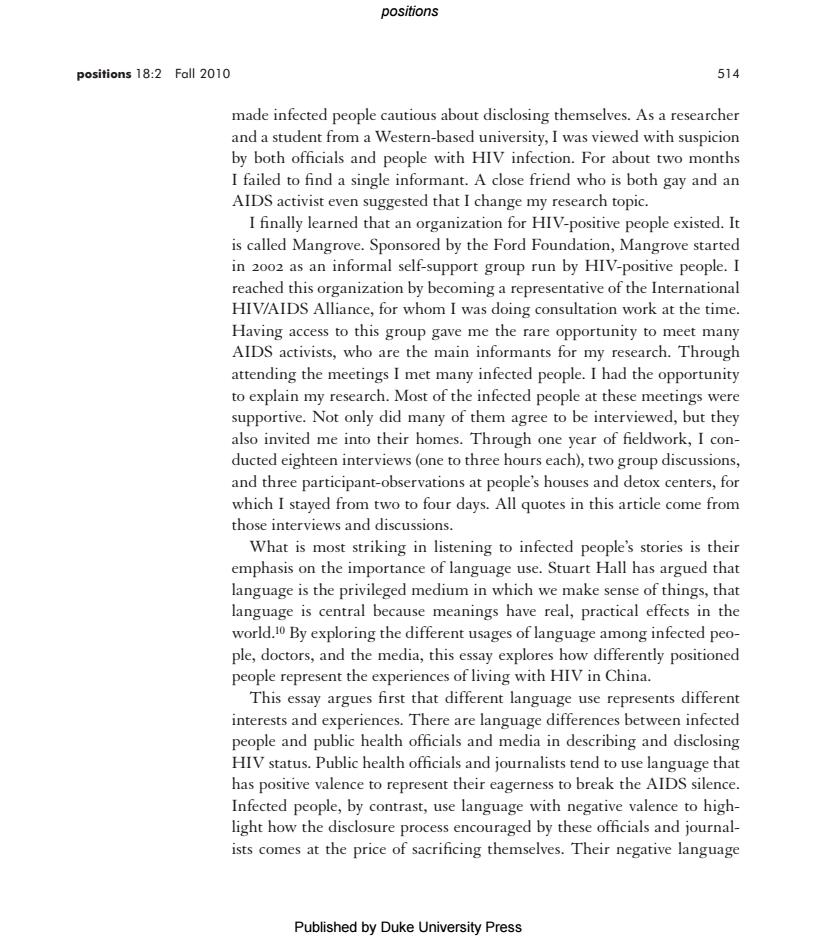正在加载图片...

positions positions 18:2 Fall 2010 514 made infected people cautious about disclosing themselves.As a researcher and a student from a Western-based university,I was viewed with suspicion by both officials and people with HIV infection.For about two months I failed to find a single informant.A close friend who is both gay and an AIDS activist even suggested that I change my research topic. I finally learned that an organization for HIV-positive people existed.It is called Mangrove.Sponsored by the Ford Foundation,Mangrove started in 2002 as an informal self-support group run by HIV-positive people.I reached this organization by becoming a representative of the International HIV/AIDS Alliance,for whom I was doing consultation work at the time. Having access to this group gave me the rare opportunity to meet many AIDS activists,who are the main informants for my research.Through attending the meetings I met many infected people.I had the opportunity to explain my research.Most of the infected people at these meetings were supportive.Not only did many of them agree to be interviewed,but they also invited me into their homes.Through one year of fieldwork,I con- ducted eighteen interviews (one to three hours each),two group discussions, and three participant-observations at people's houses and detox centers,for which I stayed from two to four days.All quotes in this article come from those interviews and discussions. What is most striking in listening to infected people's stories is their emphasis on the importance of language use.Stuart Hall has argued that language is the privileged medium in which we make sense of things,that language is central because meanings have real,practical effects in the world.0 By exploring the different usages of language among infected peo- ple,doctors,and the media,this essay explores how differently positioned people represent the experiences of living with HIV in China. This essay argues first that different language use represents different interests and experiences.There are language differences between infected people and public health officials and media in describing and disclosing HIV status.Public health officials and journalists tend to use language that has positive valence to represent their eagerness to break the AIDS silence. Infected people,by contrast,use language with negative valence to high- light how the disclosure process encouraged by these officials and journal- ists comes at the price of sacrificing themselves.Their negative language Published by Duke University Presspositions 18:2 Fall 2010 514 made infected people cautious about disclosing themselves. As a researcher and a student from a Western-based university, I was viewed with suspicion by both officials and people with HIV infection. For about two months I failed to find a single informant. A close friend who is both gay and an AIDS activist even suggested that I change my research topic. I finally learned that an organization for HIV-positive people existed. It is called Mangrove. Sponsored by the Ford Foundation, Mangrove started in 2002 as an informal self-support group run by HIV-positive people. I reached this organization by becoming a representative of the International HIV/AIDS Alliance, for whom I was doing consultation work at the time. Having access to this group gave me the rare opportunity to meet many AIDS activists, who are the main informants for my research. Through attending the meetings I met many infected people. I had the opportunity to explain my research. Most of the infected people at these meetings were supportive. Not only did many of them agree to be interviewed, but they also invited me into their homes. Through one year of fieldwork, I conducted eighteen interviews (one to three hours each), two group discussions, and three participant-observations at people’s houses and detox centers, for which I stayed from two to four days. All quotes in this article come from those interviews and discussions. What is most striking in listening to infected people’s stories is their emphasis on the importance of language use. Stuart Hall has argued that language is the privileged medium in which we make sense of things, that language is central because meanings have real, practical effects in the world.10 By exploring the different usages of language among infected people, doctors, and the media, this essay explores how differently positioned people represent the experiences of living with HIV in China. This essay argues first that different language use represents different interests and experiences. There are language differences between infected people and public health officials and media in describing and disclosing HIV status. Public health officials and journalists tend to use language that has positive valence to represent their eagerness to break the AIDS silence. Infected people, by contrast, use language with negative valence to highlight how the disclosure process encouraged by these officials and journalists comes at the price of sacrificing themselves. Their negative language positions Published by Duke University Press